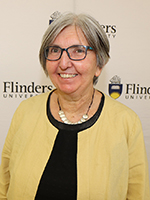Acknowledging grief in residential aged care
An article by Professor Jennifer Tieman, Director, Research Centre for Palliative Care, Death and Dying (RePaDD) and Dr Priyanka Vandersman, Research Fellow, RePaDD
In 2017, there were 4,281 deaths in the residential care setting, approximately 30% of total deaths for the state. Each year a significant number of South Australian families are affected by the decision to enter residential aged care or by the death of someone in residential aged care.
A sense of grief and loss is common among the caregiving families of aged care residents. However, there is limited information and support available to families of people living in residential aged care regarding preparedness for death and on how to deal with grief and loss. One review of residential aged care approaches noted that bereavement and its effects on staff, residents and families is under-recognised and underacknowledged and remains a silent experience. There is a need to develop a deeper understanding of the bereavement experience and to provide supports for older people and for families around entry to, and living and dying in, aged care homes.
A research team from Flinders University took up this challenge. We completed a systematic review of key literature pertaining to grief, loss, and bereavement in residential aged care. We also conducted interviews and focus group discussions with families, caregivers, and aged care staff to learn more about the needs and experiences of older people, families, and the aged care workforce.
Our research team found that the experience of grief, loss and bereavement in a residential aged care context is not well understood, and that information for families and caregivers regarding the practical and emotional challenges of transitioning to aged care – and how to manage them – is lacking. It was clear from the two studies that grief and loss were experienced not only from the point of death but across a broader period from recognising the need for residential aged care through entry into a facility and then through decline, death, and bereavement. The research also showed that staff working in residential aged care have an important role to play in supporting older people with grief and bereavement, and that their care can help residents and their families. Everyone involved in the research felt that more information for families is needed.
We used this evidence to inform the development of two new resources to support families and caregivers. The second resource was new grief pages for the GriefLink website. The second was a printed booklet, When someone dies in residential aged care: Grief and Loss for Families. The booklet reassures families about the reality of their emotions and offers practical suggestions and information about helpful resources. We distributed copies of the booklet to each residential aged care facility in South Australia and received a very positive response from facilities and families. These resources aim to build community awareness and help prepare families practically and emotionally to acknowledge and address decline, dying and grieving.
The study also reminds us that the aged care workforce is also affected by grief and loss arising from their role in caring for people coming to the end of their life. Resources such as the ELDAC Self-Care Room play an important part in supporting care workers and nurses in aged care to enable them to continue to care.
You can find out more about this project by reading the project white paper. A palliAGED InFocus on Bereavement in Aged Care provides more information and links to resources.

Professor Jennifer Tieman
Director, RePaDD

Dr Priyanka Vandersman
Research Fellow, RePaDD